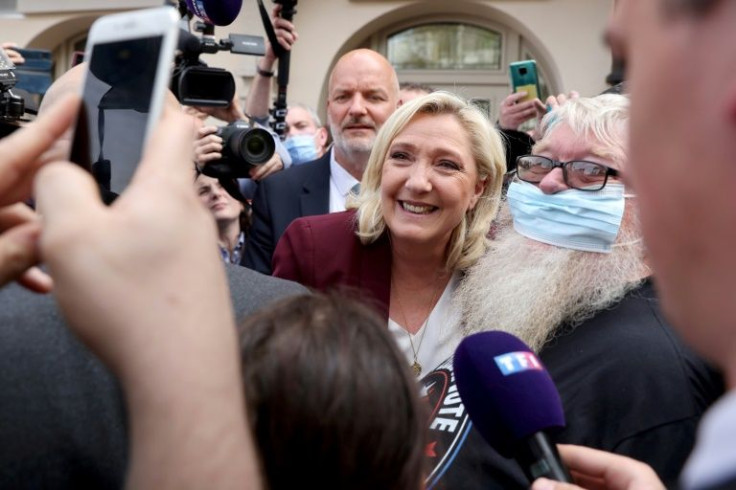Macron Defends Pensions Shift As French Campaign Brawl Heats Up
France's presidential fight shifted into higher gear Tuesday as Emmanuel Macron defended his sudden softening of pension reforms he has pushed for years, facing accusations of a "ploy" to lure left-leaning voters from his far-right rival.
Both Macron and rival Marine Le Pen pressed their on-the-ground campaigns in bids to woo wavering voters.
Macron held a long walkabout in Mulhouse, eastern France, where the president was beaten out by far-left leader Jean-Luc Melenchon in the first round of voting last Sunday.
Several residents assailed the centrist incumbent on pensions after he indicated the retirement age might be pushed back from 62 to only 64 -- instead of 65 as long promised.
"Yesterday I clarified things, if we need to be open to adapting this, I'm open to it," Macron told journalists after a heated exchange with healthcare and other workers. "It's normal that I should be ready to listen!"
Since sweeping to power in 2017, the former investment banker has said an overhaul is necessary to keep the pay-as-you-go system afloat. But a series of massive strikes and then the Covid-19 pandemic forced him to put the plan on ice in 2020.

But just last week his team had insisted that a retirement age of 65 was non-negotiable.
Le Pen pounced on the shift as a cynical bid to woo the left-wing voters analysts say Macron needs in a tight run-off on April 24.
She has promised a "social justice" campaign that would leave the retirement age at 62 -- and even lower it to 60 for people who began working before the age of 20.
"The French are very smart. Everyone knows this is a ploy by Emmanuel Macron to try to win over, or at least mollify, left-wing voters," Le Pen told France Inter radio.
"The reality is, retirement at 65 is his obsession. It's all he has ever talked about," she said.
In an interview with broadcaster TF1 Tuesday evening she added that job creation was key to creating the economic growth necessary to pay for pensions in an ageing society.
For this she would apply measures of "economic patriotism", she said.

"To enter retirement when you are still in good health is a choice that society can make," she said.
Meanwhile on Tuesday, Macron picked up a weighty right-wing endorsement from former president Nicolas Sarkozy, who broke months of campaign silence to say he would vote for Macron in the April 24 run-off.
"We must abandon our partisan habits... Fidelity to right-wing republican values and our governing culture must lead us to answer Emmanuel Macron's call for unity," Sarkozy, who remains popular among many conservative voters, posted on his Facebook page.
But the statement came just days after the candidate from Sarkozy's own Republicans party -- whom he refused to support publicly -- was eliminated in the first round.
Valerie Pecresse, budget minister in Sarkozy's government, had made several attempts to secure her former boss's blessing. Media reports claimed Sarkozy was unimpressed by her campaigning.
But Sarkozy, convicted since leaving office of both corruption and illegal campaign financing, remains a scarecrow to many on the left and he might not help Macron's effort to attract liberal voters.
Yet Macron on Tuesday also won the backing of former Socialist prime minister Lionel Jospin -- whose presidential hopes were smashed in 2002 by Le Pen's father, Jean-Marie Le Pen.
The president also got the nod from the popular former mayor of Paris, Socialist Bertrand Delanoe, whose ex-protege and current Paris mayor Anne Hidalgo suffered a humiliating rout in the first-round vote.
"I don't idolise Emmanuel Macron," Delanoe told France Inter radio. But he accused Le Pen of harbouring views as anti-immigrant and xenophobic as those of extremist media pundit Eric Zemmour, who was also eliminated from the running on Sunday.
Polls show Macron and Le Pen are in a much tighter race than in 2017, when Macron beat his far-right rival, winning 66 percent against 34 percent.
© Copyright AFP {{Year}}. All rights reserved.





















